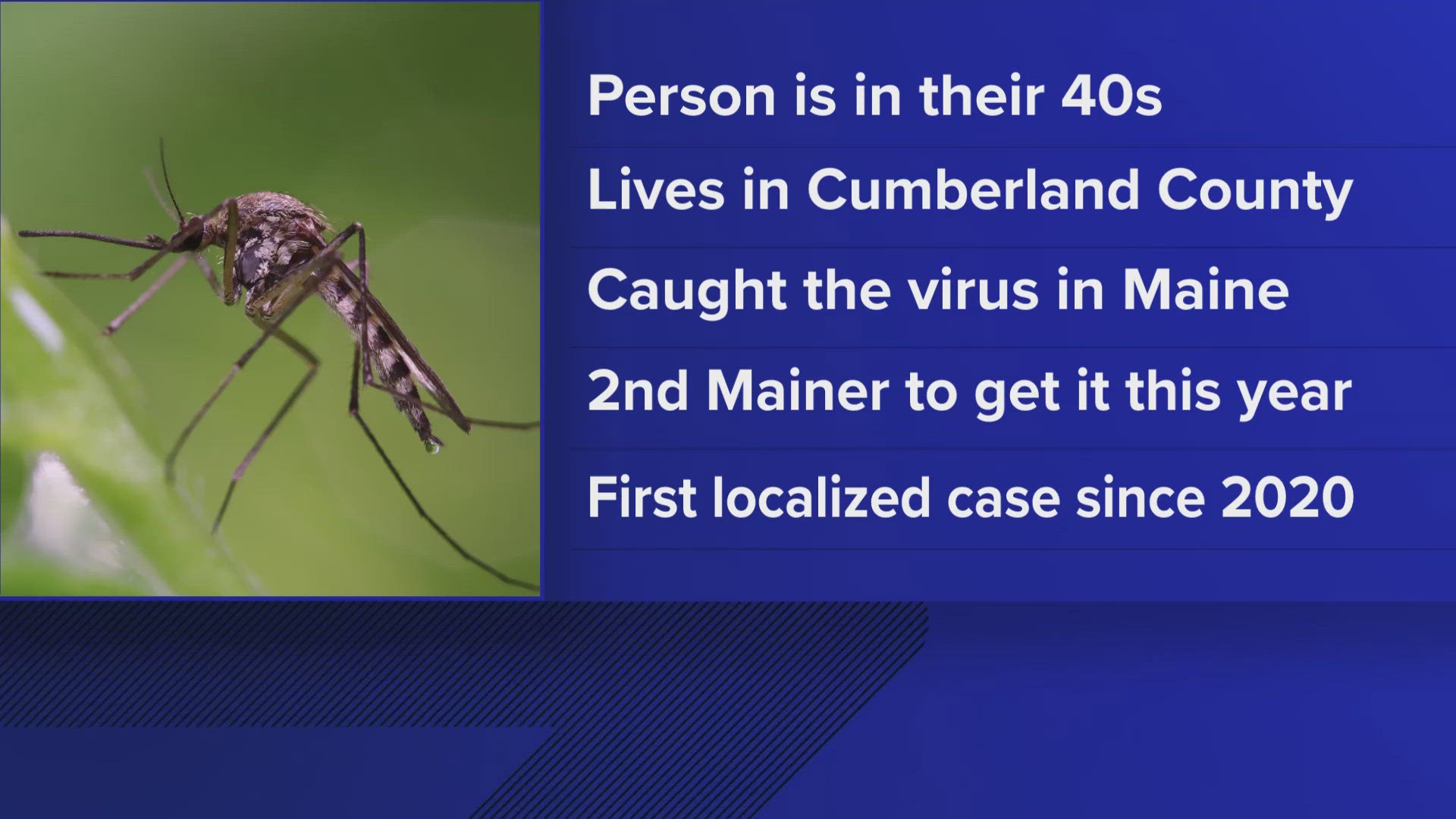AUGUSTA, Maine — Maine health officials announced the first locally acquired case of West Nile Virus in a human since 2020.
According to a release from the Maine Department of Health and Human Services, the Maine Center for Disease Control and Prevention confirmed a 40-year-old resident in Cumberland County has contracted the mosquito-borne illness.
Officials concluded the case was contracted within Maine because the resident had no history of recent travel outside the state.
"This is the first locally acquired WNV infection detected in a Maine resident since 2020 and the second Maine resident to become infected with WNV this year," the release stated. "The results are presumptive while awaiting confirmation by the U.S. Centers for Disease Control and Prevention laboratory."
The Maine CDC said WNV, along with Eastern Equine Encephalitis virus (EEE) and Jamestown Canyon virus (JCV), are spread through the bite of an infected mosquito and all usually start with flu-like symptoms in humans. However, severe symptoms can include brain swelling (encephalitis) and spinal cord inflammation (meningitis).
Officials said around one out of 150 people infected with WNV may develop a serious, sometimes fatal illness.
"For survivors, recovery may take several weeks to months, and some will have lifelong impacts. EEE, by contrast, is far deadlier with an approximate mortality rate of 30 percent for those who develop severe disease and, if survived, often has serious, lifelong neurological impacts. If you experience flu-like symptoms, severe headaches, behavior changes, or serious drowsiness, call a health care provider, especially if a COVID-19 test is negative," according to the release.
Things to note
- None of these diseases can spread from human to human or human to animal.
- The risk of being bit by a mosquito is highest from dusk to dawn and when temperatures are above 50°F. This is when mosquitoes are most active and biting.
The Maine CDC’s health and environmental testing laboratory (HETL) tests animals and mosquitoes for EEE, JCV, and WNV.
This year's report:
- EEE in 4 horses, 2 emus, 1 llama, and 1 wild turkey
- JCV in 4 mosquito pools (groups of up to 50 mosquitoes regularly tested as part of routine surveillance)
- WNV in 15 wild birds
Officials said because of the recently detected positive results, there is currently a "high risk "for those living in Cumberland, Kennebec, Penobscot, Somerset, and Waldo counties. All other counties are considered to be at an "elevated risk at this time," according to the release.
"One person has now tested positive for locally acquired WNV and four domestic animals tested positive for EEE just last week," Maine CDC Director Dr. Puthiery Va said in a statement. "Maine people know that mosquitoes are a nuisance, but we want people to be aware that they can also potentially lead to serious consequences for your health. Whether mowing the lawn, walking the dog, or enjoying a meal outside, we want all Maine people to remember to take precautions against mosquito bites whenever you go outside," she said.
When going outside, consider taking these steps to protect yourself from EEE, WNV, and JCV:
Avoid Mosquito Bites
- Apply Insect Repellent when Outdoors. Use a repellent with an EPA-registered ingredient, such as DEET, IR3535, permethrin, picaridin (KBR 3023), or oil of lemon eucalyptus (p-menthane-3,8-diol (PMD)) according to the instructions on the product label.
- Be Aware of Peak Mosquito Hours. The hours from dusk to dawn are peak biting times for many mosquitoes. Consider rescheduling outdoor activities that occur during the evening or early morning in areas of high risk.
- Wear Clothing That Can Help Reduce Mosquito Bites. Wearing long sleeves, long pants, and socks when outdoors will help keep mosquitoes away from your skin.
Mosquito-Proof Your Home
- Drain Standing Water. Mosquitoes lay their eggs in standing water. Limit the number of places around your home for mosquitoes to breed by draining or discarding items that hold water. Check rain gutters and drains. Empty unused flowerpots and wading pools and change the water in birdbaths frequently.
- Install or Repair Screens. Keep mosquitoes outside by having tightly-fitting screens on all windows and doors.
Protect Your Animals
"Animal owners should reduce potential mosquito breeding sites on their property by eliminating standing water from containers such as buckets, tires, and wading pools – especially after heavy rains," the release states. "Water troughs provide excellent mosquito breeding habitats and should be flushed out to reduce mosquitoes near paddock areas."
"Horse owners should keep horses in indoor stalls at night to reduce their risk of exposure to mosquitoes. Owners should also speak with their veterinarian about mosquito repellents approved for use in animals and vaccinations to prevent WNV and EEE," according to the release.
For more information:
- Find mosquito surveillance reports.
- View answers to frequently asked questions.
- Learn about repellents.
Editor's note: An earlier version of this article included information about the resident that was not included in the news release.

